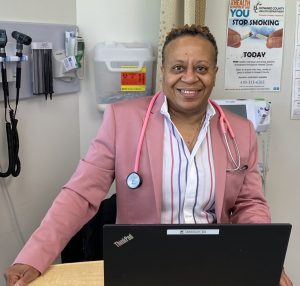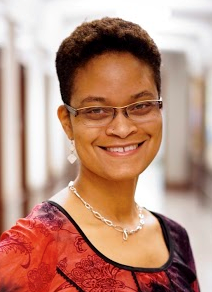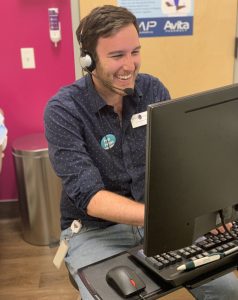PAs Take Pride in Improving Access to Care for LGBTQ Patients
“This community has a significant need for a higher level of care”
June 14, 2021
By Dave Andrews

Patient discrimination and provider prejudice are two elements of healthcare Deborah Dunn, PA-C, has tried to mitigate throughout her entire 40-year career. Dunn is especially focused on helping LGBTQ patients, a population she knows has long been marginalized.
[Learn more about the LBGT PA Caucus.]
The current state of healthcare for the LGBTQ community reminds Dunn of the early days of her career in the 1980s. Back then, the HIV epidemic was just beginning and many providers weren’t yet sure how to approach patients with HIV.
“Providers were gowning up to go in to see their HIV patients, and there were a lot of [providers] who wouldn’t even touch people with HIV,” said Dunn, who specializes in transgender/gender-diverse care at Chase Brexton Health Care in Laurel, Maryland.
“But for me, I felt like my main purpose for those first ten years of my career was to be that person who could connect with the patients and provide them with the best care possible, especially when so many other providers simply refused see them.”
Although public misconceptions and provider bias still exist today, overall access to care for people living with HIV/AIDS has improved dramatically. Unfortunately, the same cannot be said for the LGBTQ community, according to Dunn, who has extensive experiencing working in a variety of clinical and administrative settings.
“Everyone wants to say [access to care for the LGBTQ community] is better, but it hasn’t really changed significantly in the 40 years I’ve been in healthcare,” Dunn said. “It may look better on the surface, but it just has a different face.”
[Conversation with Two LBGT PA Caucus Leaders]
However, Dunn acknowledged that despite ongoing and widespread discrimination, “we have started evolving into a place where more people are accepting of others’ differences, and more people are ‘rolling up their sleeves’ and becoming advocates for change. People in the LGBTQ community have become increasingly resilient, vocal, and comfortable living authentically themselves.”
Treating patients fairly and helping them feel as comfortable as possible during visits have always been critical to Dunn’s approach. And those fundamentals are the basis of her most recent work at Chase Brexton establishing and overseeing the GenderJOY program, in collaboration with endocrinologist Dr. Elyse Pine.
GenderJOY’s detailed methodology helps ensure quality care for trans men, trans women, and non-binary patients. Thus far, the program has helped thousands of transgender and gender-diverse patients of all ages—including children and teens—access care that addresses their specific needs.
The program’s success has prompted several other healthcare groups across the country to use it as a model in establishing similar programs of their own. It has also opened up even more opportunities for Dunn and Pine to teach the program’s principles not only to their Chase Brexton colleagues, but also at several national conferences, PA schools, hospitals, and care centers throughout the country.
[2021 PA Student of the Year Advocates for LGBT PA Students and Patients]
Prioritizing Education
However, Dunn says the surface has barely been scratched. She and many other providers cite more consistent education across all healthcare curriculums regarding LGBTQ health as a key to spur more positive change.

“Providers are gradually becoming more aware of these healthcare disparities, and I do believe that most want to provide the best care possible to all of their patients,” said Tonia Poteat, PhD, MPH, PA-C, DFAAPA, associate professor of social medicine at the University of North Carolina (UNC) at Chapel Hill. “But to make a difference, they need a deeper understanding of what that means when providing care to LGBTQ patients.”
Poteat, who is also core faculty in the UNC Center for Health Equity Research, has found through her research that the number of healthcare resources and level of provider support for the LGBTQ population are lacking in many parts of the country, but especially in smaller towns and rural areas.
“Outside of larger urban areas, it’s much more difficult to find the unique support they need,” Poteat said. “Many providers understand there are things they should be doing to make their clinical setting a more welcoming space, but it’s not yet a high enough priority for most of them, particularly among those throughout the southern portions of the county.”
Poteat believes large-scale change to education is possible, as long as those organizations and entities responsible for ensuring licensure deem it a priority. She suggests requiring a level of pre-clinical training as well as creating more CME opportunities to give PAs and all other providers a clearer understanding of LGBTQ health.
“Communities are constantly growing and changing, and providers who take just one cultural competency training, for example, will not be prepared for the wide variety of people and issues they’ll encounter throughout their career,” Poteat said. “It’s essential to be continually learning and adapting to all aspects of care provision.”

Aside from pursuing formal educational opportunities, Josh Oppenheim, PA-C, who specializes in LGBTQ primary care at Prism Health in Portland, Oregon, suggests that providers can benefit from attending conferences that teach LGBTQ health, and pursuing any of the myriad volunteer opportunities with local LGBTQ groups. In his experience, Oppenheim says it’s critical to at least have a basic understanding of gender identity.
“Seeing the trauma that so many of my trans and gender-nonconforming patients have been through—especially in psychiatric care—has really opened my eyes,” Oppenheim said. “It’s made me realize this community has a significant need for a higher level of care.”
Many of Oppenheim’s gender-expansive patients initially establish care with a variety of prior mental health diagnoses. However, he says those diagnoses are sometimes found to be inaccurate because the provider(s) who gave them may have had little to no experience with gender-diverse patients, and the patient has since achieved a new level of self-acceptance.
The process that typically follows—re-establishing the patient-provider trust and co-developing a more effective care plan with the patient—is one of the aspects Oppenheim enjoys most about his practice.
[Stay connected to your PA community – join or renew your membership today]
Pride in Your Profession
Having graduated from PA school fewer than two years ago, Oppenheim says he’s grateful to have already found his ideal role helping the people with whom he feels a strong connection.
Those sentiments are echoed by Dunn, who says her practice has become progressively fulfilling throughout her nearly four decades of service.
“Focusing on transgender care has definitely been the most rewarding part of my career,” Dunn said. “The enhanced quality of life that we bring to our LGBTQ patients is absolutely priceless—to walk into a room and see a patient’s whole aura just light up because you bring them hope feels amazing. I’m so grateful to have found my calling.”
Dave Andrews is a freelance writer and public relations professional based in Northern Virginia. Contact him at [email protected].
You May Also Like
LBGT PA Caucus
Conversation with Two LBGT PA Caucus Leaders
2021 PA Student of the Year Advocates for LGBT PA Students and Patients
Thank you for reading AAPA’s News Central
You have 2 articles left this month. Create a free account to read more stories, or become a member for more access to exclusive benefits! Already have an account? Log in.



